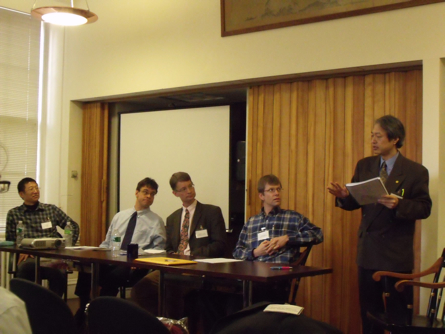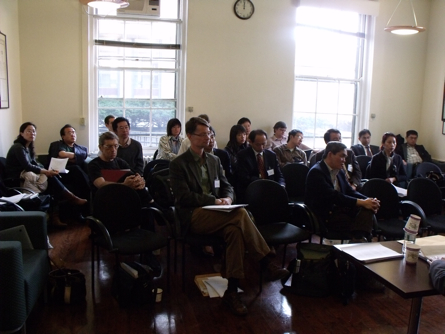【報告】International Workshop on the Research of Chinese Philosophy in Japan and Taiwan
Thanks to Professor Masayuki Sato (National Taiwan University)’s initiative, an international conference was held on March 20 and 21 at Harvard Yenching Institute, Cambridge, MA.
This conference was entitled as “International Workshop on the Research of Chinese Philosophy in Japan and Taiwan: With Critical Retrospections and Future Prospects,” co-sponsored by UTCP. There were so many scholars on Chinese Philosophy from Taiwan, Japan, and U.S.A. who interrogated the actual problems for Chinese Philosophy as a discipline. Our tentative agreement was that Chinese Philosophy in Japan became critical, so we needed strong international support for it. How we can postpone the death of Chinese Philosophy in Japan could be a next theme of our workshop.

The Program of the workshop is as follows:
First Day (Saturday, 20 March 2010)
10:00-10:10 Opening remarks from the Conference Organizers
10:10-12:10
Session One
Inquiry into Mind-Body Relationship in Chinese Philosophical Tradition
Chair and Commentator: James Robson, Harvard University
Presenter (1) : Masami Tateno, Nihon University, Japan
Myth in the Tao: Mind-body and Language in Chuang-tzu’s Tao
Presenter (2) : Yao-ming Tsai, National Taiwan University, Taiwan
A Reflection on Buddhist Approaches to the Mind-Body Relationship
12:10-13:20 Lunch break:
13: 20-14:20 Session Two
Role of Language in Early Chinese Philosophical Discourse
Chair and Commentator: Michael Puett, Harvard University
Presenter: Wim De Reu, National Taiwan University, Taiwan
Paradoxical Language on Language: A Study in Early Daoist Meta-language
14:20-14:40 Coffee break
14:40-16:40 Session Three
New Materials with New Perspectives: Japanese Perspectives on Chinese Philosophy Research
Chair and Commentator: Kurtis Hagen, SUNY Plattsburgh
Presenter (1): Takayasu Suenaga, Kagoshima University, Japan
On the Impact and Implication of the Discovery of the Guodian Manuscripts:
A Critical Reflection on the Current State of Japanese Research on the History of Pre-Qin Thought
Presenter (2): Keiji Hashimoto, Hiroshima University, Japan
Action in Wang Yangming: Encounter and Co-existence

Second Day (Sunday, 21 March 2010)
10:00-12:00 Session Four
Future Possibility and Limitation of Contemporary Neo-Confucian Research in the 21st Century
Chair and Commentator: Stephen C. Angle, Wesleyan University
Presenter (1): Bau-ruei Duh, National Taiwan University, Taiwan
Modern Neo-Confucianism: Its Influence at Taiwan and Theoretical Reflection
Presenter (2): Takahiro Nakajima, The University of Tokyo, Japan
New Confucianism in Modern Japan
12:00-12:10 Taking picture
12:10-13:20 Lunch break
13: 20-15:20 Session Five
Guideline for Life? or Texts for Philological Inquiry?: Japanese and Taiwanese
State-of-the-field of Yangming Neo-Confucianism
Chair and Commentator: Peter K. Bol, Harvard University
Presenter (1): Masaya Mabuchi, Gakushuin University, Japan
Post-War Japanese Research of Wang Yangming Neo-Confucianism Past and Present
Presenter (2): Ping-tzu Chu, National Tsinghua University, Taiwan
The Future of Confucianism in Taiwan
15:20-15:40 Coffee break 5
15:40-16:40 Session Six
Can Japanese Research on Chinese Philosophy Survive 21st Century?
Chair and Commentator: Takahiro Nakajima, The University of Tokyo, Japan
Presenter: Masayuki Sato, National Taiwan University, Taiwan
The Rise and Fall of Japanese Research on Chinese Philosophy: A Critical Look Back at Its Peculiarities
16:40-17:40 Roundtable Discussion
Co-Chaired by Masayuki Sato and Ping-tzu Chu
Discussants: Kurtis Hagen, Stephen Angle, Michael Puett






